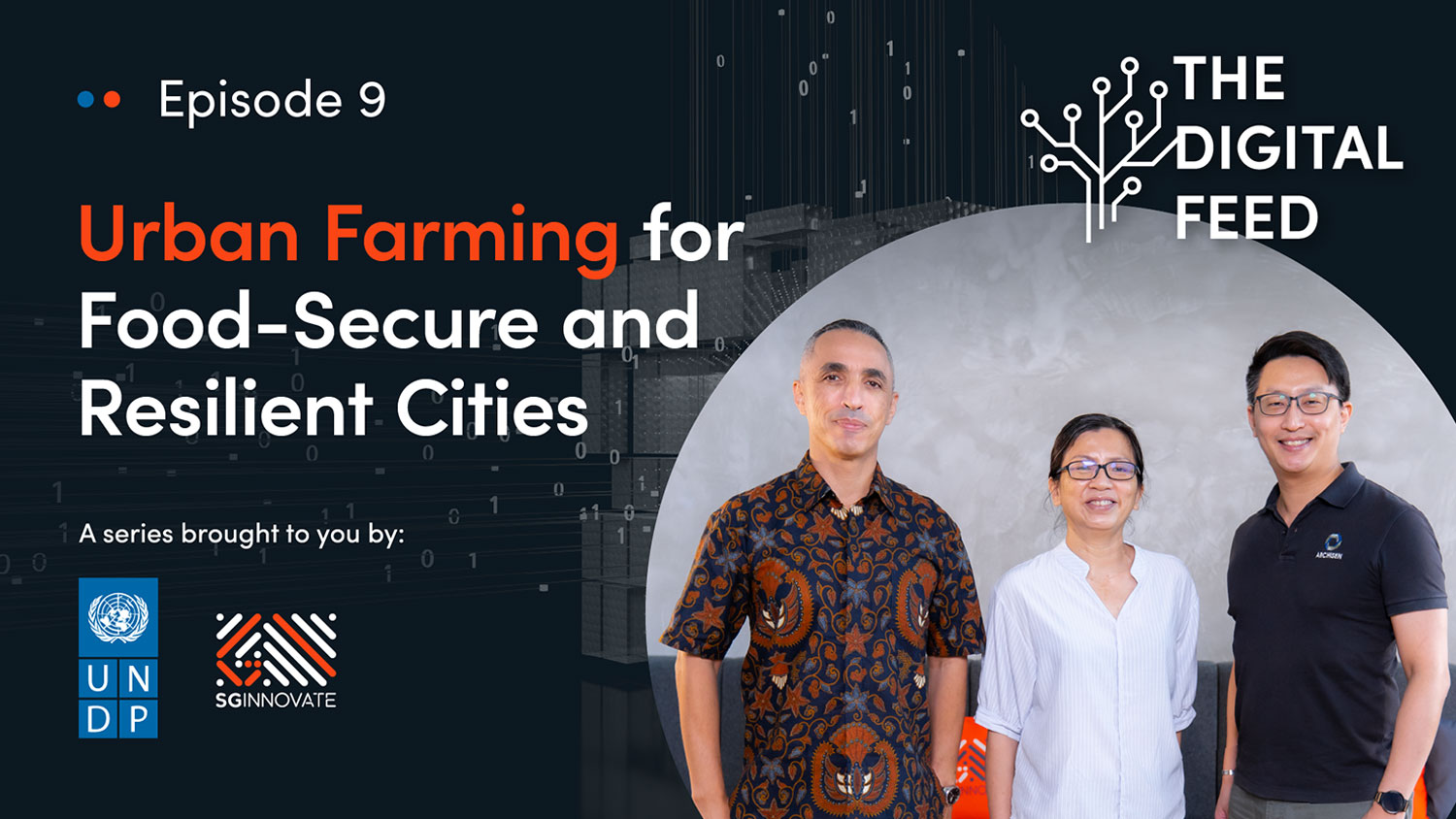The Digital Feed Episode 9: Urban Farming for Food-Secure and Resilient Cities
Mon, 03/07/2022 - 12:00
In order to find out how Singapore is fostering its local agri-food ecosystem, we invited two experts to share their views on the emerging technologies in AgriTech and working towards boosting agricultural productivity in urban farming. Watch the full interview here.
The idea of ‘farming’ is often associated with large fields or rural lands used for agriculture, but cities and urban landscapes also have a critical part to play in feeding the world. Today, nearly 80 per cent of the food produced globally is consumed in urban areas, while an estimated 70 per cent of the world population will live in cities by 2050. Current food systems are struggling to meet global food demand, and have a large environmental footprint. On the other hand, urban farming using modern techniques and emerging technologies can enable sustainable food production while using fewer resources such as land and water, and has the potential to improve food security, particularly in countries with limited resources like Small Island Developing States (SIDS).
With less than one per cent of its land available for agricultural use, Singapore (an SIDS) imports over 90 per cent of its food, making it vulnerable to disruptions in global food supply chains, as was evident during the COVID-19 pandemic. As part of efforts to strengthen food security in the country, the Government of Singapore set an ambitious ‘30 by 30’ target in 2019 to produce 30 per cent of the country’s nutritional needs locally and sustainably by 2030.
Today, Singapore is fast emerging as a global agrifood tech hub. What is the city state doing to foster its domestic agrifood ecosystem, and what can countries facing similar challenges learn from Singapore’s experience? To learn more, we invited two experts, Poh Bee Ling, director of Agri-Technology & Food Innovation at Singapore Food Agency (SFA), and Sven Yeo, co-founder of Archisen, an agritech company that designs, builds, and operates urban farming solutions.
Both Poh and Yeo agreed on the importance of innovation and technology to meet growing demands. This includes adopting urban farming techniques such as controlled environment agriculture (CEA) and vertical farming.
There is a need for us to go deeper into how technological innovations can help improve and leapfrog productivity of farms.Sven Yeo, co-founder of Archisen
Besides improving food security, localising food production also has other benefits, such as allowing for diversification of food options and customisation to meet local preferences. For instance, Archisen carries unique produce such as wasabi-like mustard greens, tangy sorrels, and ice plants grown in Himalayan pink salt. Local production also has the added benefit of making such speciality offerings more affordable.
Building the capability and capacity of local entrepreneurs is also an essential ingredient in encouraging innovation in urban farming. Poh highlighted several of SFA’s initiatives to meet the ‘30 by 30’ goal, including expansion plans for food and fish farms, co-funding schemes like the Agri-food Cluster Transformation (ACT) Fund to encourage technological adoption, and funding for innovative R&D projects, including the Singapore Food Story R&D Programme.
Yeo also noted the challenges in navigating the regulatory landscape, particularly for a new and emerging industry. He opined that the public sector could act as a catalyst for promoting novel technologies that have already proven to be beneficial in other countries and regions. He also emphasised the importance of maintaining open dialogue with regulatory bodies, understanding national priorities, and leveraging on existing initiatives to accelerate the growth of urban farms.
Poh, however, called out the importance of understanding the transferability of these innovations fully. “It is important to understand the local context as demand from consumers, climate conditions, and regulations do differ from city to city. Innovations suitable in other cities might not be as successful in land-scarce, tropical Singapore, and vice versa.
Listen to the audio version of this episode on our podcast channel on Spotify.
This article was first published here. The Digital Feed is an interview series created in collaboration with the UNDP Global Centre for Technology, Innovation and Sustainable Development in Singapore. The series delves into the latest developments, trends, and insights in the agritech and food space.
Trending Posts
- Keeping satellites safe: How CYSAT Asia 2026 is tackling space cybersecurity
- The future of fusion energy: What will it take to bring the power of the stars to earth?
- How an aerospace engineer charted a path to quantum technology
- Scaling nanomaterials is challenging — Meet the startup with a hybrid solution
- Surveying Singapore's early-stage emerging tech startup landscape






